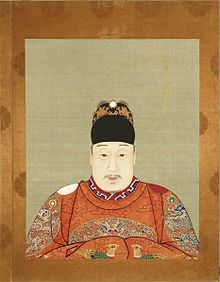Wanli Emperor
| Wanli Emperor | |||||||||||||||||
|---|---|---|---|---|---|---|---|---|---|---|---|---|---|---|---|---|---|
 |
|||||||||||||||||
| 13th Emperor of the Ming dynasty | |||||||||||||||||
| Reign | 19 July 1572 – 18 August 1620 | ||||||||||||||||
| Predecessor | Longqing Emperor | ||||||||||||||||
| Successor | Taichang Emperor | ||||||||||||||||
| Regent | Gao Gong, Gao Yi (1572) Zhang Juzheng (1572–1582) |
||||||||||||||||
| Born | 4 September 1563 | ||||||||||||||||
| Died | 18 August 1620 (aged 56) | ||||||||||||||||
| Burial | Ming tombs, Beijing, China | ||||||||||||||||
| Spouse |
Empress Xiaoduanxian Consort Gong Noble Consort Zheng |
||||||||||||||||
| Issue |
Princess Rongchang Taichang Emperor |
||||||||||||||||
|
|||||||||||||||||
| House | House of Zhu | ||||||||||||||||
| Father | Longqing Emperor | ||||||||||||||||
| Mother | Empress Dowager Xiaoding | ||||||||||||||||
| Full name | |
|---|---|
|
Family name: Zhu (朱) Given name: Yijun (翊鈞) |
|
| Era name and dates | |
| Wanli (萬曆): 2 February 1573 – 27 August 1620 | |
| Posthumous name | |
|
Emperor Fantian Hedao Zhesu Dunjian Guangwen Zhangwu Anren Zhixiao Xian 範天合道哲肅敦簡光文章武安仁止孝顯皇帝 |
|
| Temple name | |
|
Míng Shénzōng 明神宗 |
The Wanli Emperor (Chinese: 萬曆; pinyin: Wàn Lì; 4 September 1563 – 18 August 1620), personal name Zhu Yijun (Chinese: 朱翊鈞; pinyin: Zhū Yìjūn), was the 13th emperor of the Ming dynasty of China. "Wanli", the era name of his reign, literally means "ten thousand calendars". He was the third son of the Longqing Emperor. His reign of 48 years (1572-1620) was the longest among all the Ming dynasty emperors and it witnessed the steady decline of the dynasty.
Zhu Yijun ascended the throne at the age of ten and adopted the regnal name "Wanli", thus he is historically known as the Wanli Emperor. For the first ten years of his reign, he was aided by the Senior Grand Secretary (shǒufǔ), Zhang Juzheng, who governed the country as Yijun's regent. During this period, the Wanli Emperor deeply respected Zhang as a mentor and a valued minister. Archery competitions, equestrianism and calligraphy were some of the pastimes of Wanli.
As Zhang Juzheng was appointed Minister of Ming dynasty in 1572, he launched a reform by the name of “abiding by ancestors’ rules”. He started from rectifying administration with a series of measures such as reducing redundant personnel and enhancing assessment of officials’ performance. This improved officials’ quality and efficiency of administration, and based on such facts he launched relevant reforms in the fields of land, finance, and military affairs. In essence, Zhang Juzheng’s reform was a rectification of social maladies without offending the established political and fiscal system of the Ming Dynasty. Although it did not eradicate political corruption and land annexation, it positively relieved social contradictions. More over, Zhang efficiently protected the dynasty from Japan, Jurchens and Mongols so he could save national defense expenditure. By 1580s, Zhang stored astronomical numbers of silvers, this is worth second only to 10 years of Ming's total tax revenue. Wanli's first 10 years regime led Ming's renaissance economically,culturally and militarily. In China, this era is called as Wanli's renaissance(萬曆中興))
...
Wikipedia
